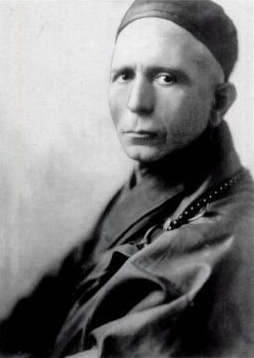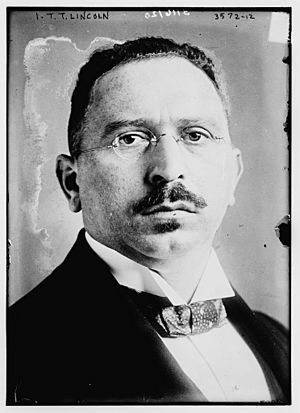Ignaz Trebitsch-Lincoln facts for kids
Quick facts for kids
Ignatius Timothy Trebitsch-Lincoln
|
|
|---|---|

Trebitsch-Lincoln as Chao Kung
|
|
| Born | 4 April 1879 Paks, Austria-Hungary
|
| Died | 6 October 1943 (aged 64) |
| Nationality | Hungarian |
| Occupation | Adventurer, con artist |
Ignatius Timothy Trebitsch-Lincoln (born Ignác Trebitsch) was a Hungarian adventurer who lived from 1879 to 1943. He was known for changing his identity and beliefs many times.
He started his life as a Jewish person, then became a Christian missionary and an Anglican priest. Later, he became a British Member of Parliament. He also worked as a spy, a German politician, and even a Buddhist abbot in China. At one point, he even claimed to be the Dalai Lama!
Contents
Early Life and Travels
Ignácz Trebitsch was born in 1879 in a town called Paks, in Hungary. His family later moved to Budapest.
After leaving school, he studied acting but often got into trouble with the police. In 1897, he left Hungary and went to London. There, he met Christian missionaries and decided to change his religion.
He was baptized on Christmas Day in 1899. He then went to Germany to study to become a minister. But he was restless and soon went to Canada. He worked there as a missionary, helping Jewish people in Montreal. He returned to England in 1903 after a disagreement about his pay.
In 1904, he officially changed his name to Tribich Lincoln. He became a British citizen in 1909.
Becoming a Member of Parliament
Trebitsch-Lincoln was very good at talking his way into new situations and meeting important people. He even met a very important church leader, the Archbishop of Canterbury. This leader gave him a job as a priest in Appledore, Kent.
Soon after, he met Seebohm Rowntree, a rich chocolate maker and an important member of the Liberal Party. Rowntree offered him a job as his private secretary. With Rowntree's help, Trebitsch-Lincoln was chosen to run for Parliament in Darlington in 1909. Even though he was still a Hungarian citizen, he won the election in January 1910! He beat the person who had held the seat for many years.
However, Members of Parliament (MPs) did not get paid at that time. Trebitsch-Lincoln's money problems got worse. When another election was called later that year, he couldn't afford to run again. Darlington then voted for its old representative.
A Life of Changing Sides
Before the First World War, Trebitsch-Lincoln tried many business ideas, but they all failed. He lived in Bucharest for a while, hoping to make money in the oil business.
Back in London and broke, he offered to work as a spy for the British government. When they said no, he went to the Netherlands. There, he contacted the Germans, who hired him to work for them. He was supposed to spy for both sides, which is called being a "double agent."
He returned to England but almost got caught. So, he left for the United States in 1915. There, he met a German military official. When the Germans told the official not to work with Trebitsch-Lincoln, he sold his story to a newspaper. The New York World Magazine published his story with a big headline. He also wrote a book called Revelations of an International Spy in 1916.
The British government wanted to avoid embarrassment. They hired a detective agency to find him. He was sent back to England, not for spying, but for tricking people out of money. He spent three years in prison. After he was released in 1919, he was sent out of the country. He also lost his British citizenship.
Germany and Austria
As a refugee with no money, Trebitsch-Lincoln slowly became involved with groups in Germany that had very strong political ideas. He met important figures like Wolfgang Kapp. In 1920, after a failed attempt by Kapp to take over the government, Trebitsch-Lincoln was put in charge of checking what news could be published. During this time, he met Adolf Hitler.
When Kapp's attempt failed, Trebitsch-Lincoln fled south. He kept trying to get involved in different political groups. He even joined a group of royalists and others from across Europe. He was trusted with their important papers, but he quickly sold the information to different governments' secret services. He was put on trial in Austria but was found not guilty. Still, he was sent out of the country again.
Becoming a Buddhist Monk
Trebitsch-Lincoln eventually ended up in China. He worked for three different warlords, including Wu Peifu.
In the late 1920s, after a special experience, Trebitsch-Lincoln became a Buddhist. He became a monk. By 1931, he became an abbot, which is a leader of a monastery. He started his own monastery in Shanghai. Everyone who joined had to give all their belongings to him. He now called himself Abbot Chao Kung.
In 1937, he changed his loyalties again, this time to Japan. He created propaganda against the British for them. However, Chinese sources say he also wrote articles for European newspapers that criticized Japan's actions in China.
After the Second World War began, he also contacted the Nazis. He offered to broadcast for them and to encourage all the Buddhists in the East to go against British influence. Important Nazi officials thought this idea was serious. It was even suggested that Trebitsch-Lincoln go with German agents to Tibet to make this plan happen. He even said he was the new Dalai Lama after the 13th Dalai Lama died. The Japanese supported this, but the Tibetans did not.
Some high-ranking Nazis were very excited about his ideas. However, these plans stopped after one of them flew to Scotland in 1941. After this, Adolf Hitler ended all such mystical schemes. Still, Trebitsch-Lincoln might have continued working for German and Japanese security services in Shanghai until he died in 1943.
Death
Trebitsch-Lincoln wrote a letter to Hitler protesting the Holocaust. The Nazi leaders then asked the Japanese government in Shanghai to poison Trebitsch-Lincoln in 1943. We don't know what happened with this request. However, Trebitsch-Lincoln did die of stomach problems in Shanghai in 1943, when he was 64 years old.
A person named Yosef Nedava attended his funeral. He thought the coffin might have been empty. Years later, Nedava wrote a book about Trebitsch-Lincoln.
Images for kids
See also
 | Ernest Everett Just |
 | Mary Jackson |
 | Emmett Chappelle |
 | Marie Maynard Daly |



